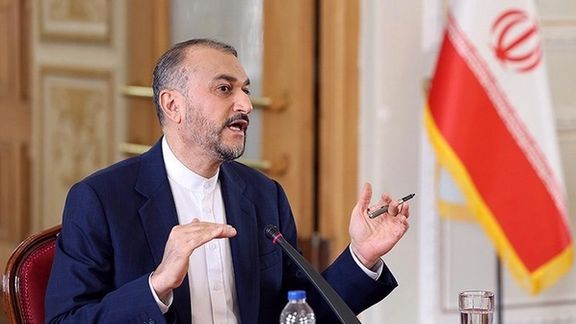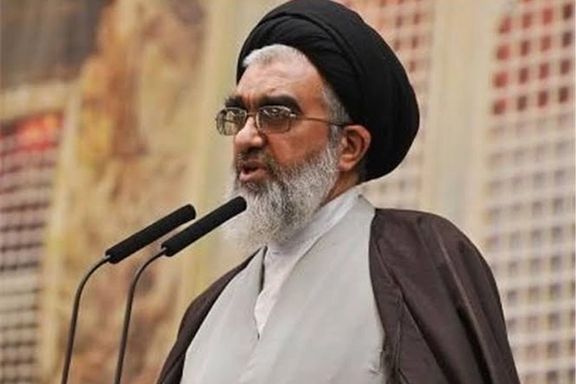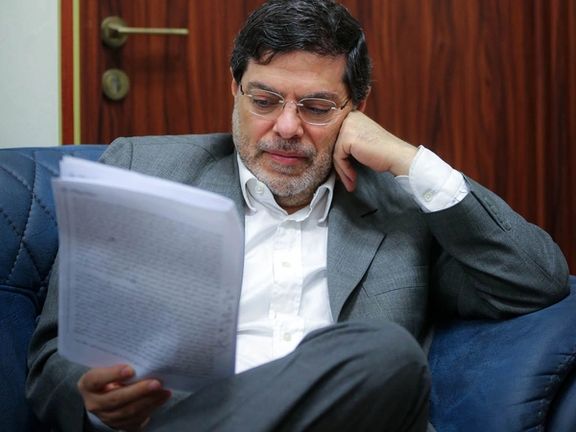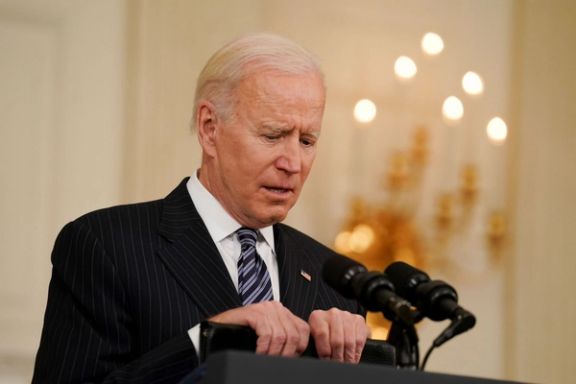FM Claims Russia Pledges Not To Use Iranian Drones In Ukraine Conflict

Iran's Foreign Minister claims Russia has said it will refrain from utilizing Iranian weaponry in the ongoing conflict in Ukraine.

Iran's Foreign Minister claims Russia has said it will refrain from utilizing Iranian weaponry in the ongoing conflict in Ukraine.
Hossein Amir-Abdollahian made this assertion during a diplomatic visit to South Africa, just three days after he denied any involvement in sending drones to Russia during a visit to Japan.
His announcement follows the contentious discourse surrounding the delivery of Iranian-manufactured drones to Russia, a development that garnered international attention following the Kremlin's invasion of in Ukraine. Although Iran initially denied allegations of providing Shahed suicide drones to Russia, Amir-Abdollahian eventually acknowledged the transfer in November 2022. He claimed that these deliveries occurred in a restricted capacity before the Ukrainian conflict began.
However, Ukrainian authorities have vehemently disputed Iran's narrative and produced a alrge amount of physical evidence showing that Iran continues to deliver hundreds of drones.
During discussions with Japanese officials in Tokyo, Amir-Abdollahian repeated Iran's position that it had not supplied drones for use in the Ukrainian conflict. He also dismissed tangible evidence from Ukraine showing the use of Iranian drones.
The European Union, the United Kingdom, the United States, and Canada, have implemented a series of punitive measures against Iran in response to allegations of drone deployments which purportedly targeted civilian zones and critical infrastructure within Ukraine. Within Iranian political circles, there has been a noticeable surge of criticism surrounding the potential repercussions of these alleged actions.

The representative of Iran’s Supreme Leader Ali Khamenei in Qom has urged for adhering to “religious values in sports”.
As part of the Iranian regime’s crackdown on defiance against mandatory hijab, Mohammad Saeedi said that sports activities must align with the country's religious principles, urging for the compulsory hijab for female athletes.
"The hijab is an adornment for female athletes," Saeedi stated. "In sports, we are not supposed to do whatever they ask us to do, but we only do sports that do not contradict our religious values."
"Hijab is an adornment for female athletes in domestic and international gatherings, and if our ladies want to be approved by God, they must separate themselves from people who violate values."
These remarks come in the wake of recent events that have raised concerns about the treatment of female athletes in Iran. Morality police in the southern port city of Bandar Abbas on the Persian Gulf recently detained female athletes during a simple morning workout.
A significant number of Iranian athletes, particularly women, have defected from national teams in recent years, seeking asylum in other countries. This exodus has been attributed to a combination of factors, including a lack of attention, threats, mandatory hijab, corruption within sports federations, and Iran's policy of not allowing athletes to compete against Israelis.
Mohammad Saeedi said that sports activities must align with the country's religious principles, urging for the compulsory hijab for female athletes.
"The hijab is an adornment for female athletes," Saeedi stated. "In sports, we are not supposed to do whatever they ask us to do, but we only do sports that do not contradict our religious values."
"Hijab is an adornment for female athletes in domestic and international gatherings, and if our ladies want to be approved by God, they must separate themselves from people who violate values."
These remarks come in the wake of recent events that have raised concerns about the treatment of female athletes in Iran. Morality police in the southern port city of Bandar Abbas on the Persian Gulf recently detained female athletes during a simple morning workout.
A significant number of Iranian athletes, particularly women, have defected from national teams in recent years, seeking asylum in other countries. This exodus has been attributed to a combination of factors, including a lack of attention, threats, mandatory hijab, corruption within sports federations, and Iran's policy of not allowing athletes to compete against Israelis.

Mohammad Marandi, a regime insider in Iran, says that Tehran will have full access to its funds when they are released from South Korea following a hostage deal.
It was confirmed on Thursday that five American hostages in Iran were released from prison and put under house arrest, pending the release of $6 billion of Iranian funds held in South Korea due to US sanctions.
Marandi, who was part of Iran’s nuclear negotiating team in Vienna in 2021-2022 tweeted that “Iran will have full and direct access to its released assets, there will be no Qatari companies involved, Iranian banks will have full control, and they can purchase goods and services without any limitation or restriction.”
United States officials have insisted that any frozen funds released from Iraq or South Korea can only be disbursed by US supervision for humanitarian purchases by Iran. The New York Times quoted sources on Thursday that Qatar’s Central Bank might become the repository of Iran’s funds, but the scheme for supervising its expenditure remains unclear.
Iran’s foreign ministry said in a statement on Friday that “The Islamic Republic will decide how to use the released funds, and these funds will be appropriated for the various needs of the country by the appropriate authorities.”
Critics say that the funds would boost the Iranian regime's finances, whether released in cash or with restrictions. If Iran can import food with the funds, it will use its own oil income for its military or malign activities.
Chief of Iran’s central bank visited Qatar in June, in what was interpreted at the time as a trip to begin coordination regarding any possible funds being released from Iraq or South Korea.

As the White House welcomed the possible release of US hostages in Iran, critics called the $6 billion to be freed in exchange the biggest ransom ever paid by the United States.
Iran immediately corrected the $6-billion amount mentioned by Western media and said that in fact $9 billion was freed, including close to $3 billion frozen in Iraqi banks in addition to $6 billion held by South Korea. In fact, Washington freed the frozen funds in Iraq in June, possibly as the first concession to Tehran in negotiations that seem to have reached a conclusion.
Iranian government media on Friday made it clear that no prisoner will leave Iran until all the money from South Korea is transferred to special accounts in Qatar.
The Biden administration to cushion the negative impact of what is seen as a ransom payment, emphasized that no cash will reach the Iranian government and that the funds will only be disbursed to pay for humanitarian needs, but the exact mechanics of the scheme remain unclear.
The Iranians who see themselves as the big winners in hostage diplomacy, which has often paid off in the past four decades, even claimed that they will be the ones who will decide the fate of the money.
“The Islamic Republic will decide how to use the released funds, and these funds will be appropriated for the various needs of the country by the appropriate authorities,” the foreign ministry said in a statement on Friday.
Mohammad Jamshidi, a top aide to President Ebrahim Raisi, was quoted by the official government news agency IRNA that American prisoners will remain in Iran until all the funds from South Korea are released. Iranian media said that the funds will be exchanged from Korean currency into euros and kept in special accounts in Qatar’s central bank. The White House thanked the Qataris for their good offices in helping secure the deal.
Secretary of State Antony Blinken said on Thursday that the release of five Americans from prison in Iran was a "positive step" and the beginning of a process that he expects will lead to their return to the United States.
Blinken told reporters at a news conference after a meeting with his Mexican counterpart that the State Department had spoken with the five Americans on Thursday and that he was not aware of any other Americans still detained in Iran.
Iranian American activists were deeply dismayed by the Biden administration’s decision to provide a significant financial boost to the clerical regime, which is facing a serious economic crisis.
Amir Hamidi, a former US government official and a political consultant in Washington DC tweeted, “Allocating a staggering $6 billion to Iran amounts to facilitating the transfer of American hostages to a new detention facility, which is an utterly unacceptable concession. We must unwaveringly uphold the principle of not negotiating with terrorists or rewarding hostage-taking.”
Republican law makers almost immediately responded by accusing the Biden administration of caving in to Iran’s hostage diplomacy.
Senator Bill Hagerty (R-TN) said, “The release of American hostages is great and welcome news, But Biden’s policies encourage more hostage taking…The ransom is now $1.2 billion per hostage. Russia and China are taking note.”
Rep. Joe Wilson (R- S. Carolina) posted that “The terrorist regime in Tehran just received a gift of $6 billion from the Biden administration. Biden is showing our adversaries how to evade sanctions & is threatening the safety of Americans around the world.”
The debate around the administration’s Iran policy will take a sharper turn with the hostage deal and will probably become an issue in the 2024 elections. However, President Joe Biden seems to have succeeded in putting a lot of distance between the controversial decision and the election 15 months away.

The United States has confirmed that five Americans have been released from prisons in Iran and are under house arrest, after what reports say is a deal with Tehran.
Iranian sources told the media that the deal would unfreeze $6 billion in Iranian funds in South Korea and some Iranians from US prisons.
"We are relieved to learn that Iranian authorities have released five US citizens -- Siamak Namazi, Morad Tahbaz, Emad Sharghi, and two individuals who at this time wish to remain private -- from prison to house arrest, State Department spokesperson Matt Miller told the media.
“We are in touch with the families of US citizens involved, and we continue to monitor these individuals’ health and welfare closely. While we welcome the news of these individuals’ release from prison to house arrest, they should never have been imprisoned in the first place. We continue to work diligently to bring these individuals home to their loved ones.They must be allowed to depart Iran and reunite with their loved ones as soon as possible," Miller added.
Allowing the five to leave Iran could take weeks, Reuters said, while it is not clear if all the details of releasing the funds held in South Korea have been agreed or not.
"The move by Iran of the American hostages from Evin Prison ... is an important development," Jared Genser a lawyer representing Namazi said in a statement. "While I hope this will be the first step to their ultimate release, this is at best the beginning of the end."
White House National Security Council Spokesperson Adrienne Watson confirmed that the five were all out of prison and under house arrest, saying they should never have been detained and the White House would have little more to add because talks for their eventual release "remain ongoing and are delicate."
Iran's mission to the United Nations, however, told Iranian state media the release of the dual nationals from prison was part of a US-Iranian prisoner exchange deal.
"Under the deal mediated by a third country, five Iranians jailed in the United States will be released and Iran's frozen funds in South Korea will be unblocked and transferred to Qatar," the mission said, according to state news agency IRNA.
DEPARTURE FROM IRAN COULD TAKE WEEKS
Iranian Americans, whose US citizenship is not recognized by Tehran, are often pawns for the Islamic Republic which has a long history of taking Westerners hostage to use as leverage against the United States and European governments.
The five Americans will be allowed to leave Iran after $6 billion of Iranian funds in South Korea are unfrozen, a source told Reuters. A second source familiar with the talks said it could be weeks before the US citizens leave Iran, saying September was a possible time frame. He confirmed unfreezing the funds may be part of the deal.
However, he said the funds, if transferred from the South Korean banks to another financial institution, would go from one restricted account to another and could only be used for humanitarian purposes such as buying food or medicine.
Iran's semi-official Tasnim news agency said the funds were first to be converted from the South Korean currency into Euros and then sent to an account in Qatar that Iran could access.

The potential transfer drew immediate Republican criticism that President Joe Biden, a Democrat, had effectively paid a ransom for the US citizens and that Iran using the money for humanitarian goods could free up funds for its nuclear program or to back militias in nations such as Iraq, Lebanon and Yemen.
Henry Rome, an analyst at the Washington Institute for Near East Policy, told Reuters the deal could help reduce tensions that have boiled since then US President Donald Trump, a Republican, withdrew from a 2015 nuclear deal designed to curb Iran's atomic program.
Rome described the potential release of the five as a step forward "in the broader US efforts to de-escalate tensions in the absence of a nuclear agreement" adding that the White House "wouldn't have gone through with the deal if it wasn't confident it could withstand whatever political blowback is forthcoming."
Karim Sadjadpour, a Carnegie Endowment for International Peace analyst, told Reuters that Iranian Americans should still avoid travel to Iran.
"This deal will reinforce the view of (Iran's) Revolutionary Guards that hostage taking is a lucrative practice with minimal costs," he said.
Namazi, who in 2016 was convicted of espionage-related charges the United States has rejected as baseless, has been detained by Iran for more than seven years.
Tahbaz was arrested in 2018 and sentenced to 10 years in prison for "assembly and collusion against Iran's national security" and working for the United States as a spy. Sharghi was convicted of espionage in 2020 and also sentenced to 10 years.

A fire has erupted on a Panama-flagged tanker carrying 40,000 tons of LPG off the southern coast of Assalouyeh, Iran.
Port authorities have successfully rescued 22 sailors, but the blaze has spread across multiple sections of the vessel, prompting immediate containment efforts.
In May, Iran seized two oil tankers – one Panama-flagged and one Marshal Islands-flagged within one week in Persian Gulf waters, marking an escalation in a series of attacks on commercial vessels since 2019.
The US Navy reported that the Panama-flagged oil tanker Niovi was seized by Iran's Islamic Revolutionary Guard Corps Navy (IRGCN) while navigating the narrow Strait of Hormuz.
These events underscore the persistent maritime security concerns in the region, where heightened military activity and geopolitical tensions have cast significant threats upon commercial vessels.
In response to these dynamics, over 3,000 US sailors and marines from the Bataan Amphibious Ready Group (ARG) and 26th Marine Expeditionary Unit (MEU) have been deployed to the Middle East. This robust deployment serves to address escalating tensions between the US and Iran and projects US maritime strength in the face of Iran's aggressive actions, including their recent unveiling of new maritime weaponry.
The ongoing deployment, encompassing vital waterways like the Strait of Hormuz, Red Sea, Suez Canal, and Strait of Bab el-Mandeb, highlights the US Navy's steadfast commitment to securing critical choke points and reinforcing alliances in a complex and challenging geopolitical environment.